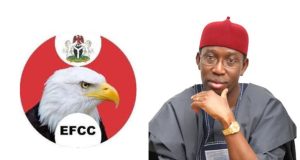Breaking: EFCC Arrests Former Delta Governor Ifeanyi Okowa Over Alleged ₦1.3 Trillion Fraud

The Economic and Financial Crimes Commission (EFCC) arrested Ifeanyi Okowa, the former governor of Delta State. This arrest follows serious allegations of financial mismanagement involving ₦1.3 trillion in funds that his administration intended for state development from 2015 to 2023.
Community groups and political stakeholders pressured the EFCC regarding these allegations. They accuse Okowa of diverting funds meant for oil-producing communities in Delta State. The focus centers on the 13 percent derivation fund allocated to states from the federation account, which is crucial for local development projects.
Reports indicate that investigators took Okowa into custody on November 4, 2024. He voluntarily appeared at the EFCC’s Port Harcourt office after receiving an invitation from them. Sources within the commission state that his detention relates not only to the alleged diversion of ₦1.3 trillion but also to claims about an additional ₦40 billion he misappropriated while investing in UTM Floating Liquefied Natural Gas shares.
The allegations against Okowa are serious and complex. Investigators claim he failed to provide adequate accounts for both the derivation funds and the supposed investment in shares meant to support an offshore liquefied natural gas project. These financial maneuvers raise questions about transparency and accountability within his administration.

Community leaders from oil-producing areas expressed frustration over how these funds were managed. They argue that misappropriation has hindered essential development projects that could uplift local communities struggling with poverty and inadequate infrastructure. Earlier this year, representatives from various ethnic nationalities in Delta State urged President Bola Tinubu to ensure that Okowa faces accountability for his actions.
Comparing Fates: Okowa vs. Bello
This arrest raises broader issues of governance and corruption in Nigeria. As a former vice-presidential candidate for the Peoples Democratic Party (PDP), Okowa’s situation raises concerns about political integrity in Nigeria. Many question whether politicians prioritize serving their constituents or enriching themselves.
In contrast, Yahaya Bello, the former governor of Kogi State, remains at large despite facing serious allegations himself. Bello currently battles legal accusations of money laundering amounting to ₦80.2 billion with the EFCC. His case highlights a perceived double standard in Nigeria’s fight against corruption; while Okowa faces immediate consequences for his alleged misdeeds, Bello has evaded capture since leaving office earlier this year.

Bello’s tenure included controversy over accusations of financial impropriety and a notorious denial of COVID-19’s existence within his state. Despite these serious allegations—and multiple attempts by law enforcement to apprehend him—Bello has managed to avoid arrest by leveraging his political connections and immunity as a sitting governor until recently.
The contrasting fates of these two governors highlight a troubling narrative within Nigerian politics: some officials face swift justice for their alleged crimes while others navigate legal challenges with relative ease. This disparity raises questions about accountability and whether influential politicians can manipulate systems designed to uphold justice.
Public Reaction and Future Implications
The EFCC confirmed Okowa’s detention but refrained from providing further comments on ongoing investigations. This silence adds suspense as citizens await more details about the charges against him and potential implications for other officials who may be implicated in similar schemes.
The unfolding situation has sparked discussions on social media platforms. Many Nigerians express their views on accountability and corruption within government ranks. The public’s reaction indicates a growing demand for transparency and justice as citizens seek assurance that those in power will be held responsible for their actions.
This story underscores a critical moment for Nigeria’s fight against corruption—a battle that continues to challenge the nation’s political landscape. The outcome of this case could set important precedents regarding how allegations of corruption are handled at high levels of government.
Ifeanyi Okowa’s arrest by the EFCC marks a pivotal moment in Nigeria’s ongoing struggle with corruption and accountability in governance. As investigations proceed into his alleged financial misconduct, all eyes will also be on Yahaya Bello’s case as it unfolds—will he ultimately face justice or continue to evade it? The answers may shape public perception of governance in Nigeria for years to come.

